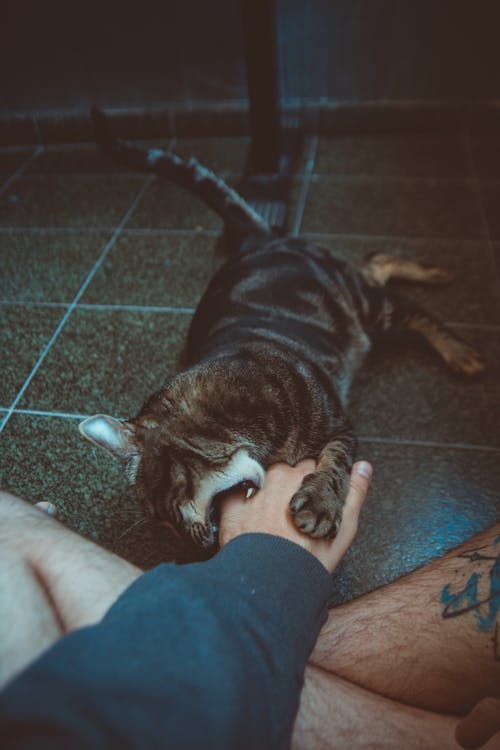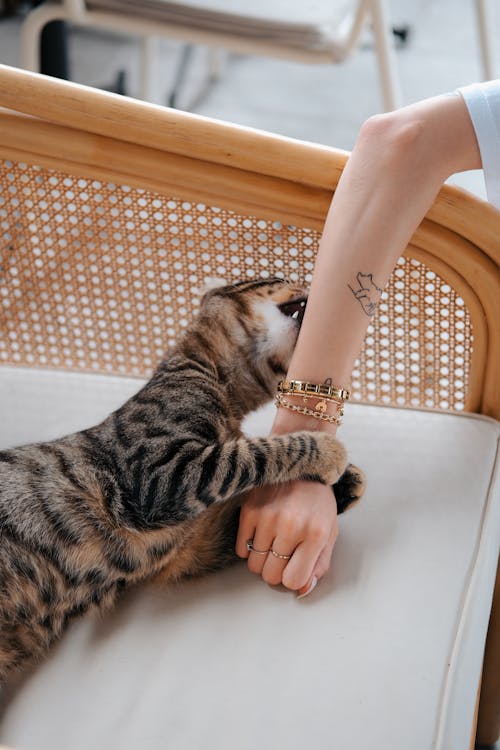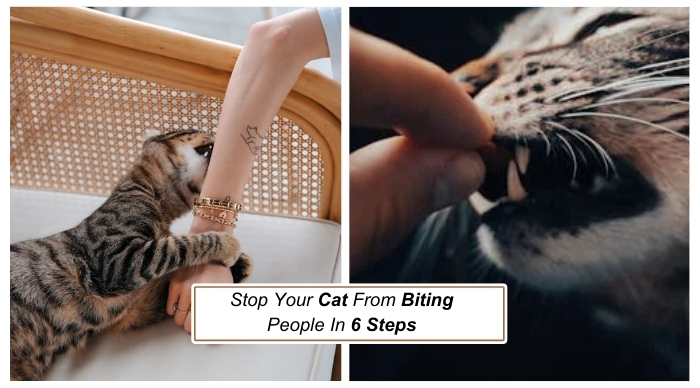It is quite a joy to have a cat around; however, what do you do if that beautiful furry friend of yours starts biting? From a cute nip to a nasty assault, a bite can be baffling and frustrating for cat parents.
Of course, you might be wondering, Why does my cat suddenly nip me? or “Why does my cat bite me, and how to stop it?” —You’re not alone! In this article, we will highlight the reasons why your cat bites, what this means, and how to stop your cat from biting with six simple steps.
Why Do Cats Bite?
Cats communicate in ways we don’t always understand. A bite could mean anything from playful affection to overstimulation or even fear.

Here are some common reasons your cat might bite:
- Petting Aggression: Your cat may love petting, but there’s a limit. Overstimulation can cause some cats to lash out suddenly.
- Playfulness: Kittens, in particular, often bite as part of play. They see your hands as toys and don’t know better.
- Fear or Stress: If your cat feels threatened or cornered, biting might be a defensive reaction.
- Territorial Behavior: Cats can become possessive of their space, leading to unprovoked “attacks.”
- Gentle Bites (Love Bites): Sometimes, cats gently bite as a quirky way of showing affection—though it can still hurt!
Understanding the reason behind the behavior is the first step toward resolving it.
6 Steps to Stop Your Cat From Biting People – Useful Tips
Here are six effective strategies to stop your cat from biting, no matter the reason:
1. Recognize Early Warning Signs

Pay attention to your cat’s body language during interactions. Watch for signs like:
- Tail twitching or lashing.
- Flattened ears.
- Dilated pupils.
- Sudden tenseness in their body.
These are cues that your cat is reaching their limit and may bite if the behavior continues.
2. Avoid Overstimulation

Many cats experience petting aggression, especially if stroked for too long or in areas they dislike. Follow these tips:
- Focus on petting areas your cat enjoys, such as the head or chin.
- Avoid sensitive spots like the belly unless you know your cat loves it.
- Keep petting sessions short and sweet to avoid overwhelming your cat.
3. Redirect Playful Biting

If your cat bites while playing, they might see your hands as a toy. Here’s how to fix this:
- Use interactive toys like feather wands or laser pointers to channel their energy.
- Avoid roughhousing with your hands, as this encourages biting behavior.
- Provide plenty of toys, such as balls or plush mice, to keep them entertained.
4. Set Boundaries Consistently

Your cat needs to understand that biting is not acceptable. Use these strategies:
- Say a firm “No!” or “Ouch!” when your cat bites, then withdraw attention.
- Avoid yelling or physical punishment—it can increase fear and aggression.
- If biting persists, calmly leave the room to show your cat that biting ends the fun.
5. Provide a Stress-Free Environment

Unprovoked biting could stem from fear or anxiety. To help your cat feel secure:
- Create safe spaces where they can retreat when overwhelmed.
- Keep their routine consistent with regular feeding and playtimes.
- Use calming aids, like pheromone diffusers, to reduce stress.
6. Train Using Positive Reinforcement

Reward good behavior to encourage your cat to act appropriately:
- Give treats and praise when your cat plays gently or allows petting without biting.
- Avoid rewarding biting, even unintentionally (e.g., pulling your hand away in a way that seems playful).
- Be patient — training takes time, especially with older cats.
Why Does My Cat Bite Me Gently?
Your cat bites only slightly, which is sometimes called a love bite. This is their unique way of expressing affection! He does not intend to do any harm, but does not it feel somewhat uncomfortable?

Usually accompanied by snuggles, these are your cat’s way of bonding with you. Love bites often happen during some petting or cuddling. Not harmful, but you can deter this by giving them toys instead or by stopping petting them when they bite.
What Does It Mean When Your Cat Bites You?
Because cat biting is context-dependent and mood-dependent. Those are some common reasons why your cat may bite you.
- Playful Behavior
This resembles hunting, and cats often bite each other playfully as well. Gentle little nibbles are generally a sign of excitement or play, particularly when it is a kitten.
2. Overstimulation
If you were petting your cat for a long time and it bites you suddenly, it is probably overstimulated. Also called as petting-induced aggression.
3. Stress or Fear
If a cat is feeling scared, threatened, or cornered, it will bite in self-defense. Signs of this would be you see the cat’s ears flatten or you see their tail puffed up
4. Affectionate Love Bites
Cat love bites are not painful or harmful, nor do they cause any injury and are thus supposed to be a sign of affection. Such love bites are often accompanied by purring or kneading.
5. Communication
A nibble could be a message: “Cut it out,” or “feed me,” or “let me be.”
6. Health Issues
Bite suddenly could indicate a care pain. If this is a new or unusual behavior, consider contacting your veterinarian to see if there are any underlying medical problems.
How to Get My Cat to Stop Biting Me?
Consistency is key. Announce the play by following the steps above—identify triggers, redirect, and reward appropriate behavior. Do not jerk your hand away when they bite. Firstly, understand why your cat bites—are you biting the cat? But cat biting can also be due to overstimulation or fear.
Why do cats bite when you stroke them?
This is usually because of staging aggression. When you rub your cat, you often rub from their head toward their back, where their hair grows. Cats make this kind of rubbing with the body, which is what can make them feel very relaxed.

It can also lead to them biting you when they feel you have petted them too much or made them uncomfortable. Even if they love it at first there comes a point where the stroking becomes too much. This is especially the case for petting aggression in cats.
How to Stop a Biting Cat?
Knowing the reason helps you to customize your approach. Playful or fear-driven biting is something that can be addressed through consistent training and by reducing their stress levels.

Slowly and steadily, with a goal! Encourage them with rewards, and Keep an eye out for signs When they scratch your furniture, redirect their interests to toys or scratching posts instead.
Wrapping Up
Dealing with cat bites can be confusing, but with some time and understanding, you can help nip this habit in the bud. Ignoring their triggers and setting boundaries will really help whether they nip playfully or immediately bit while being petted. Just make sure to give your feline friend lots of love, plenty of toys, and plenty of places that are free from stress, so you can keep your cat happy, and a happy cat is most definitely a no-bitey cat!
Know any stories or tips about getting bitten? Let us know in the comments—we want to hear from you!


